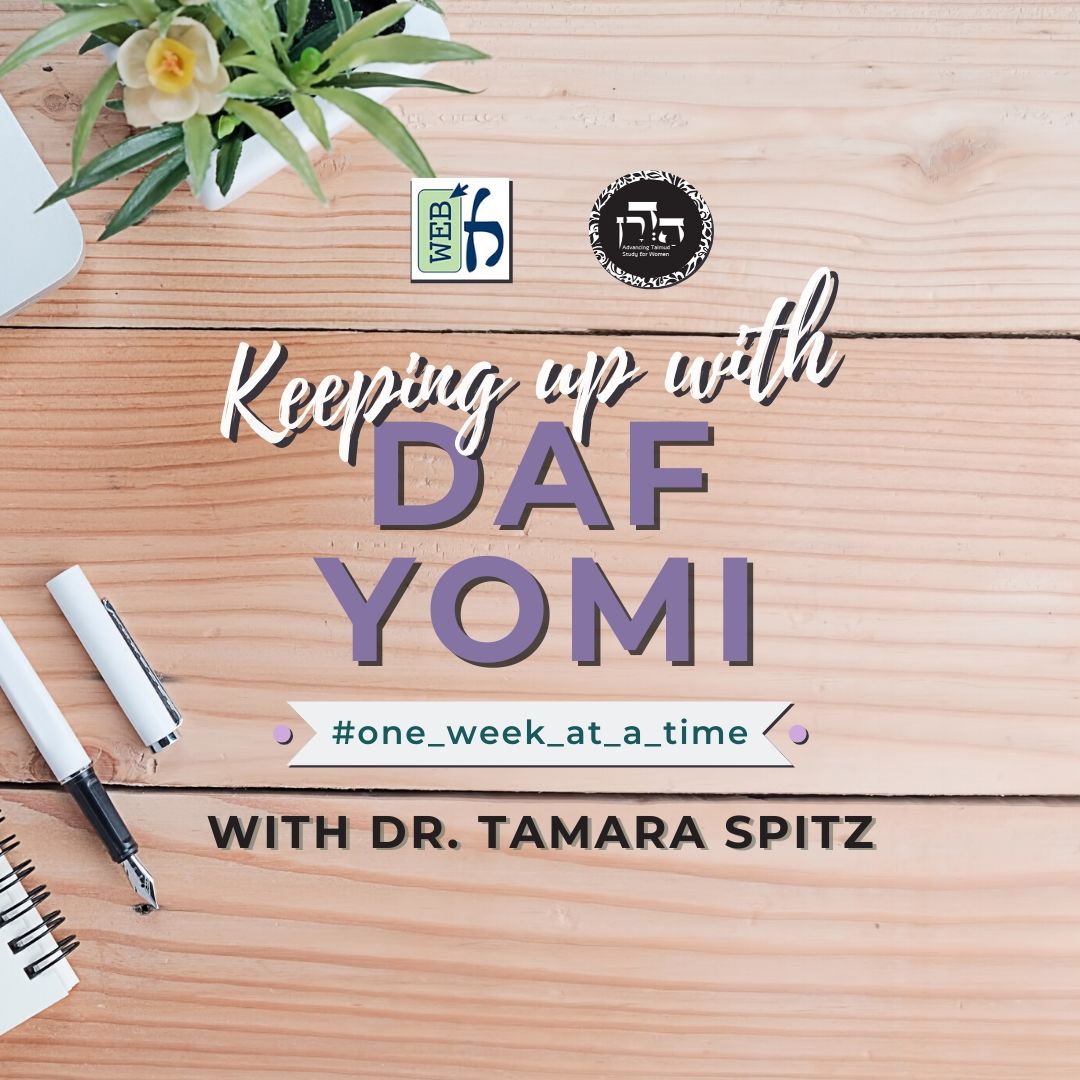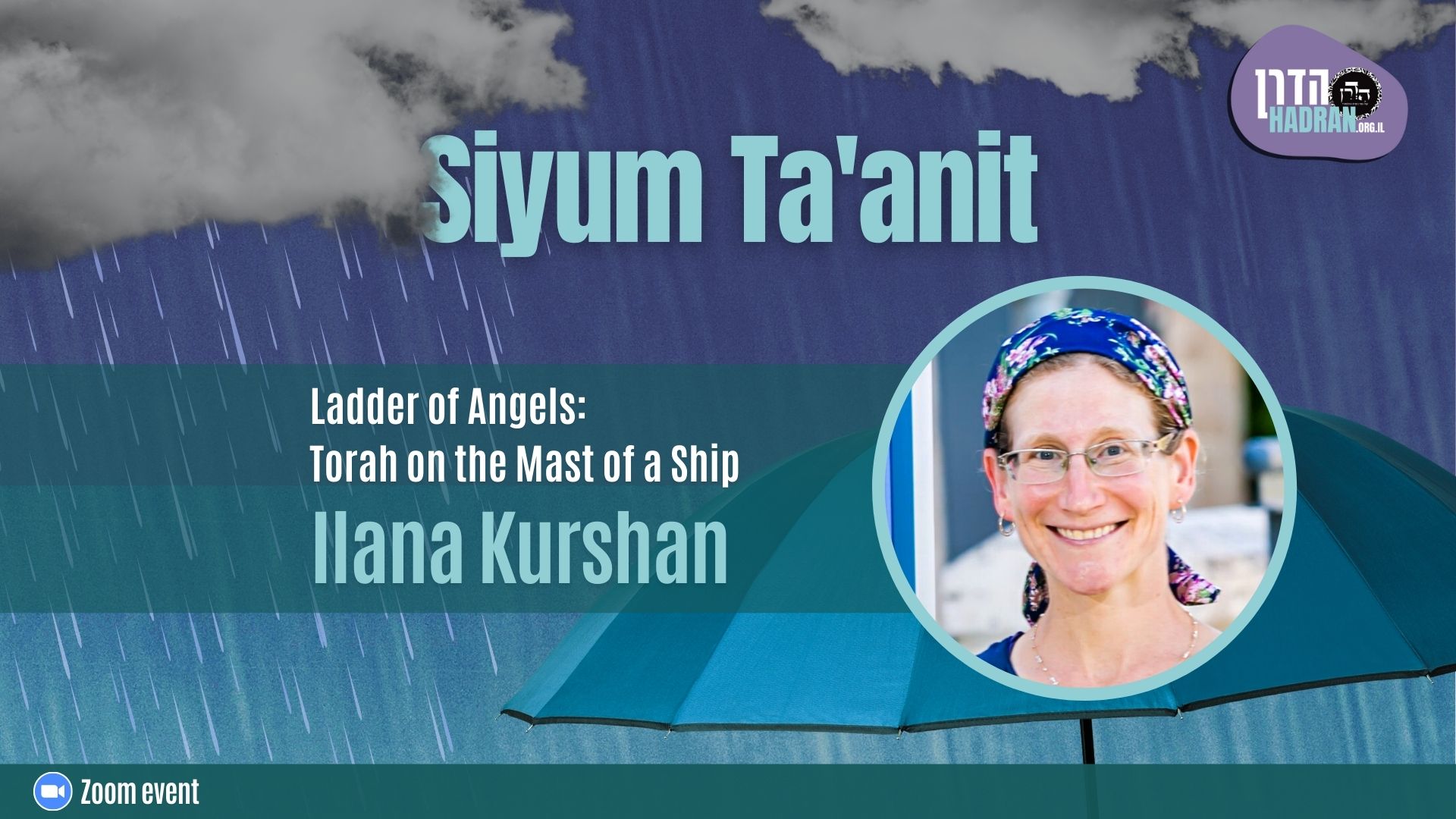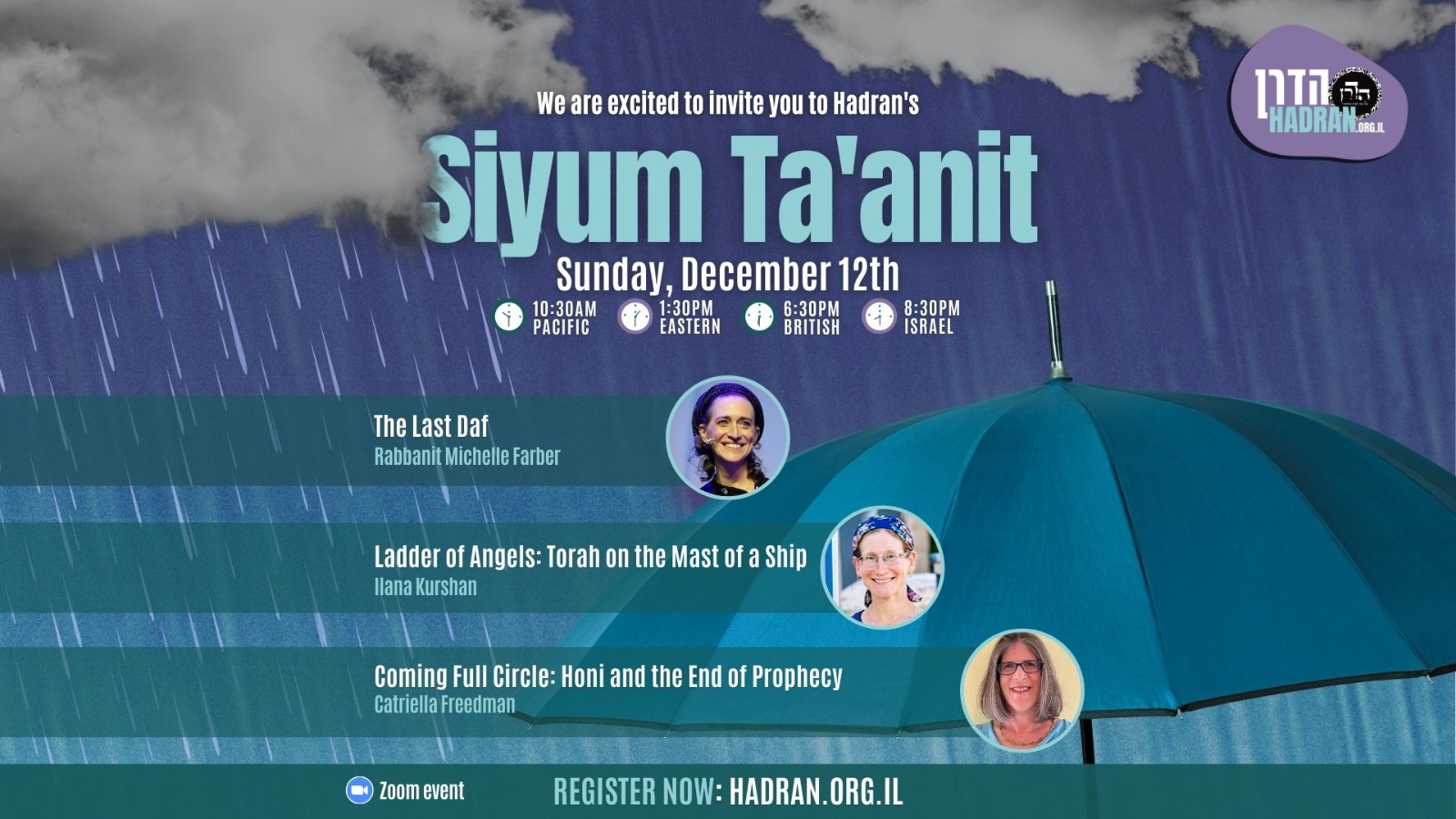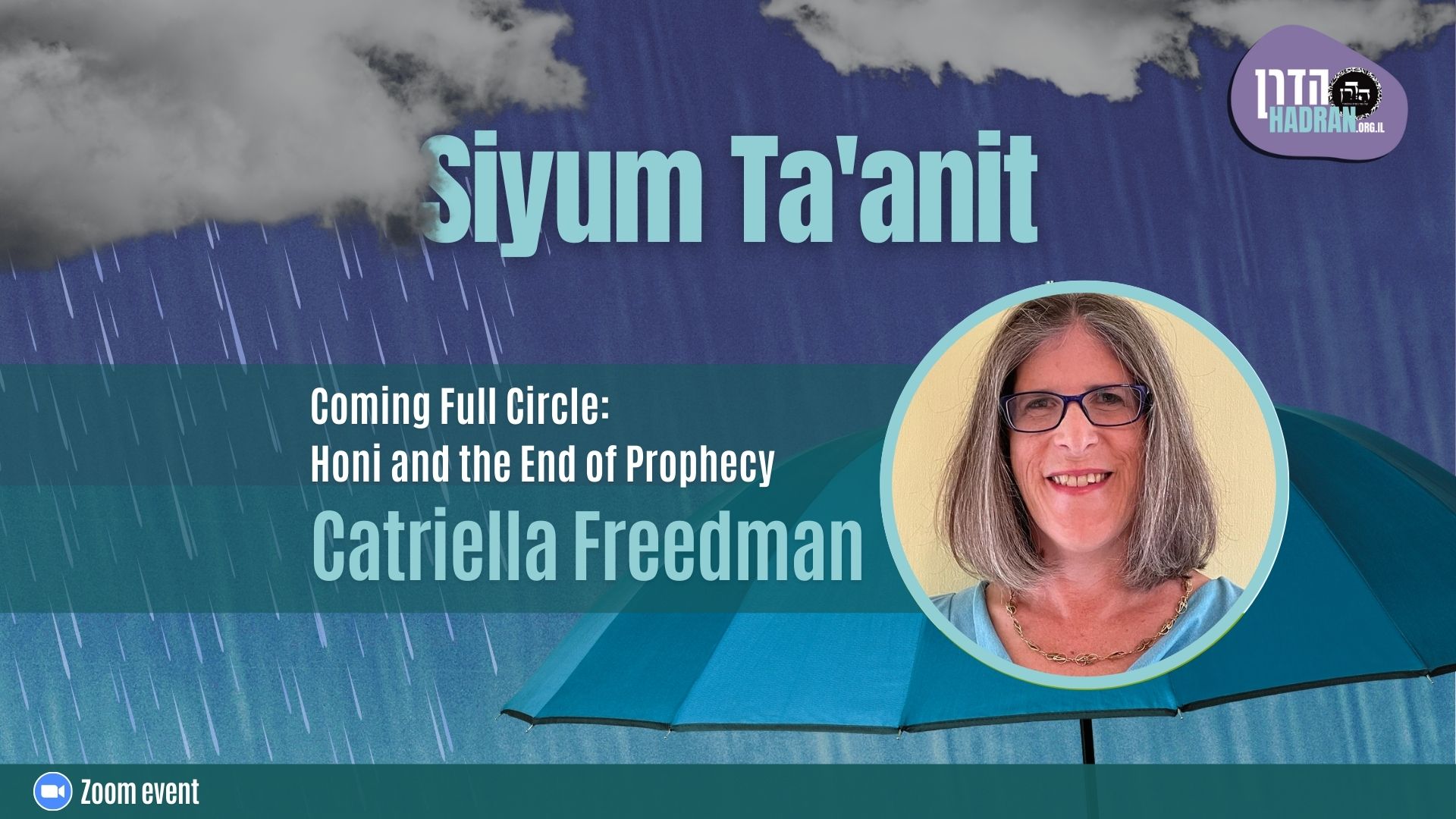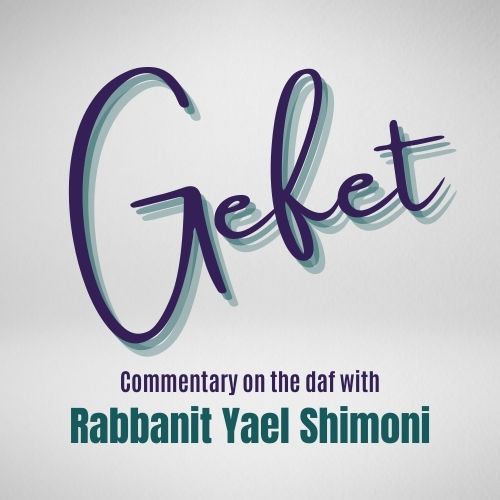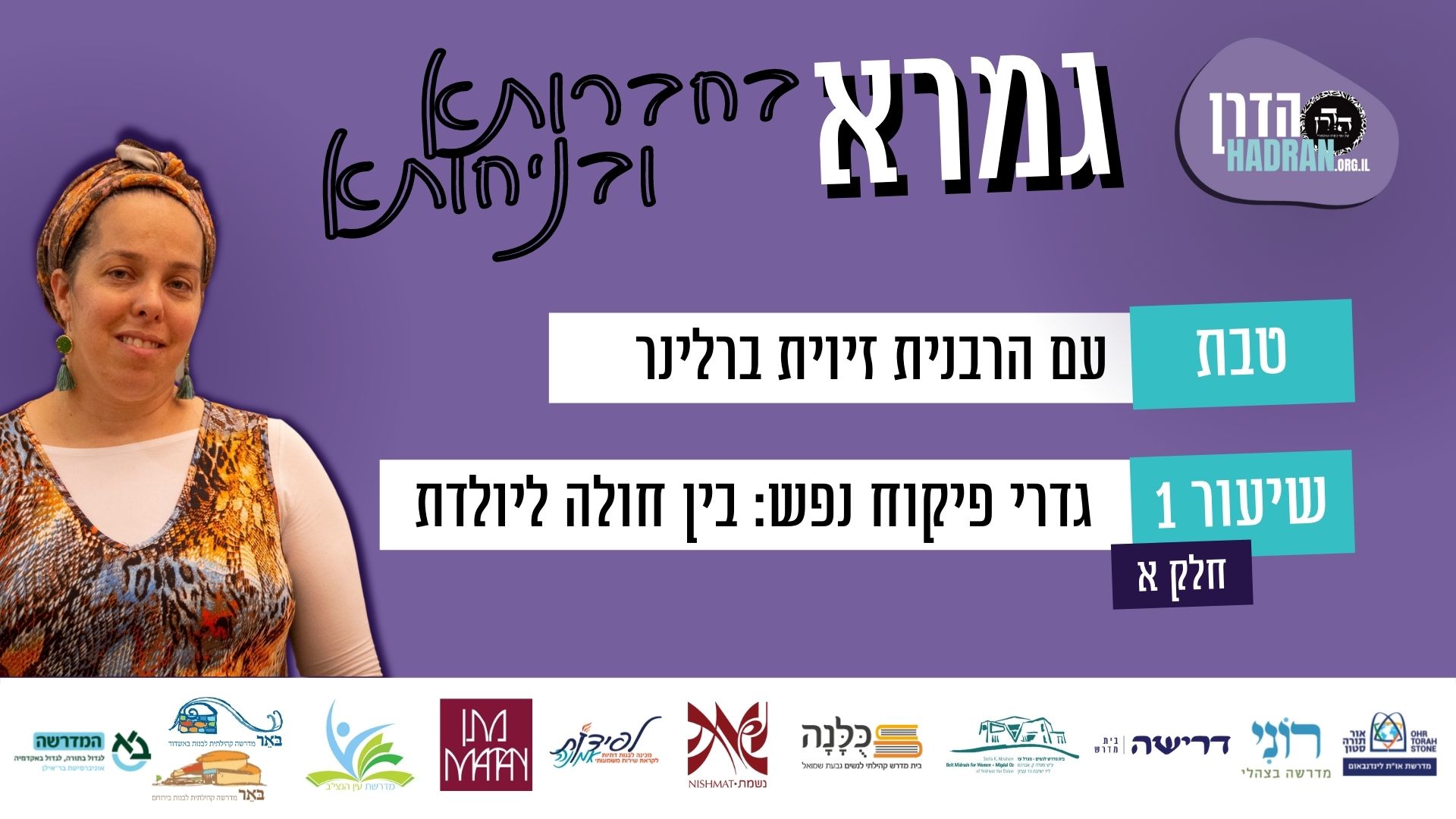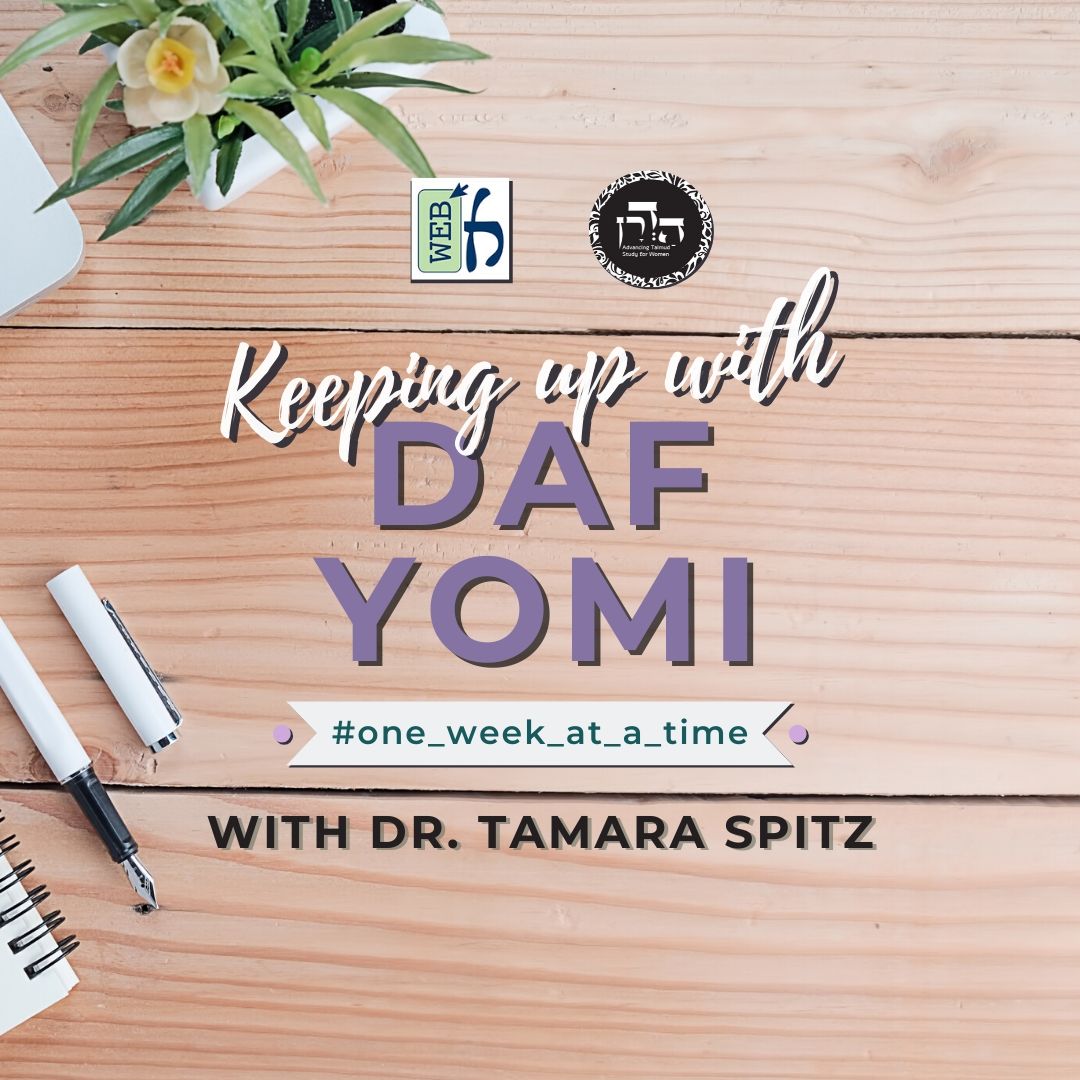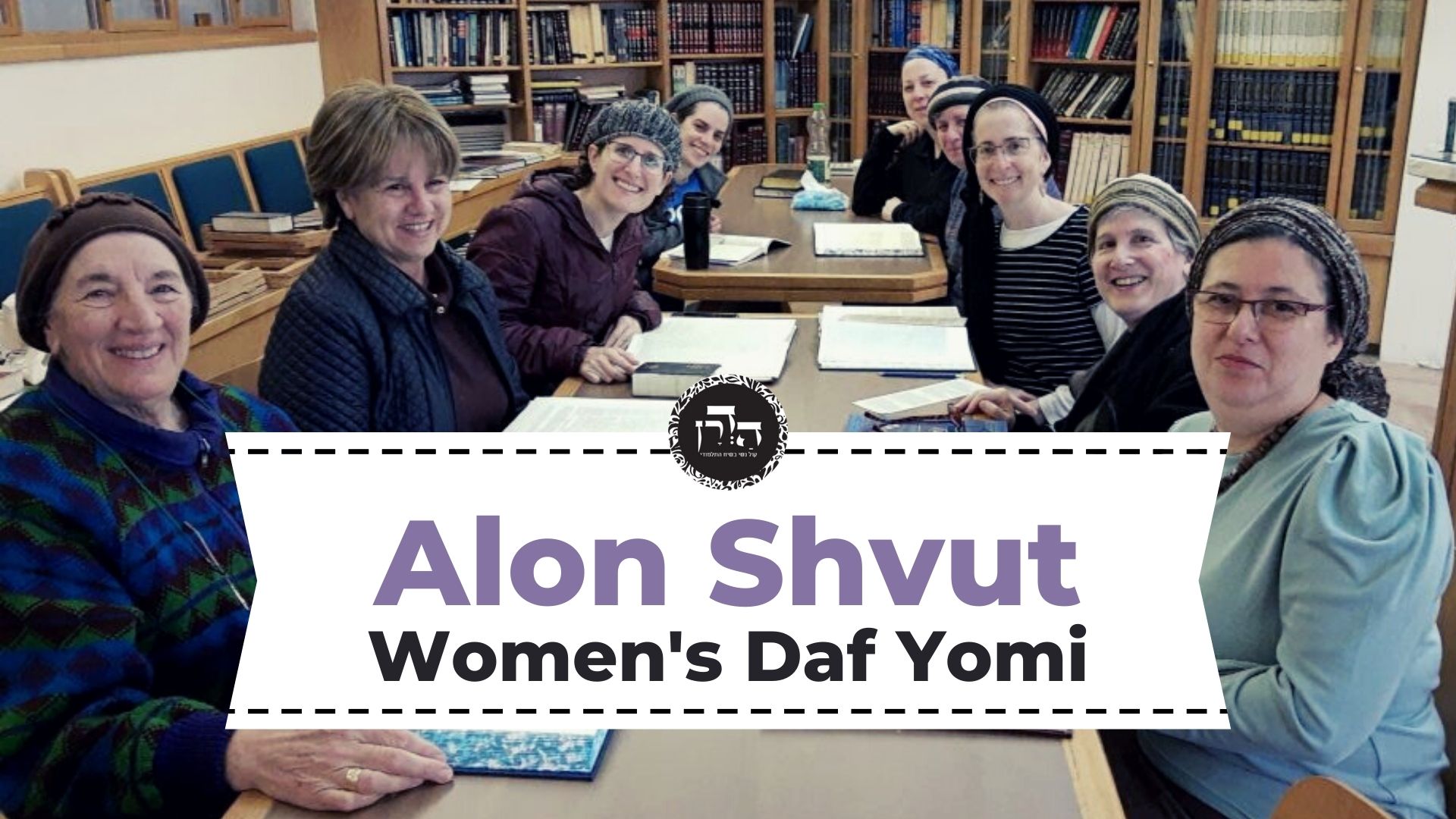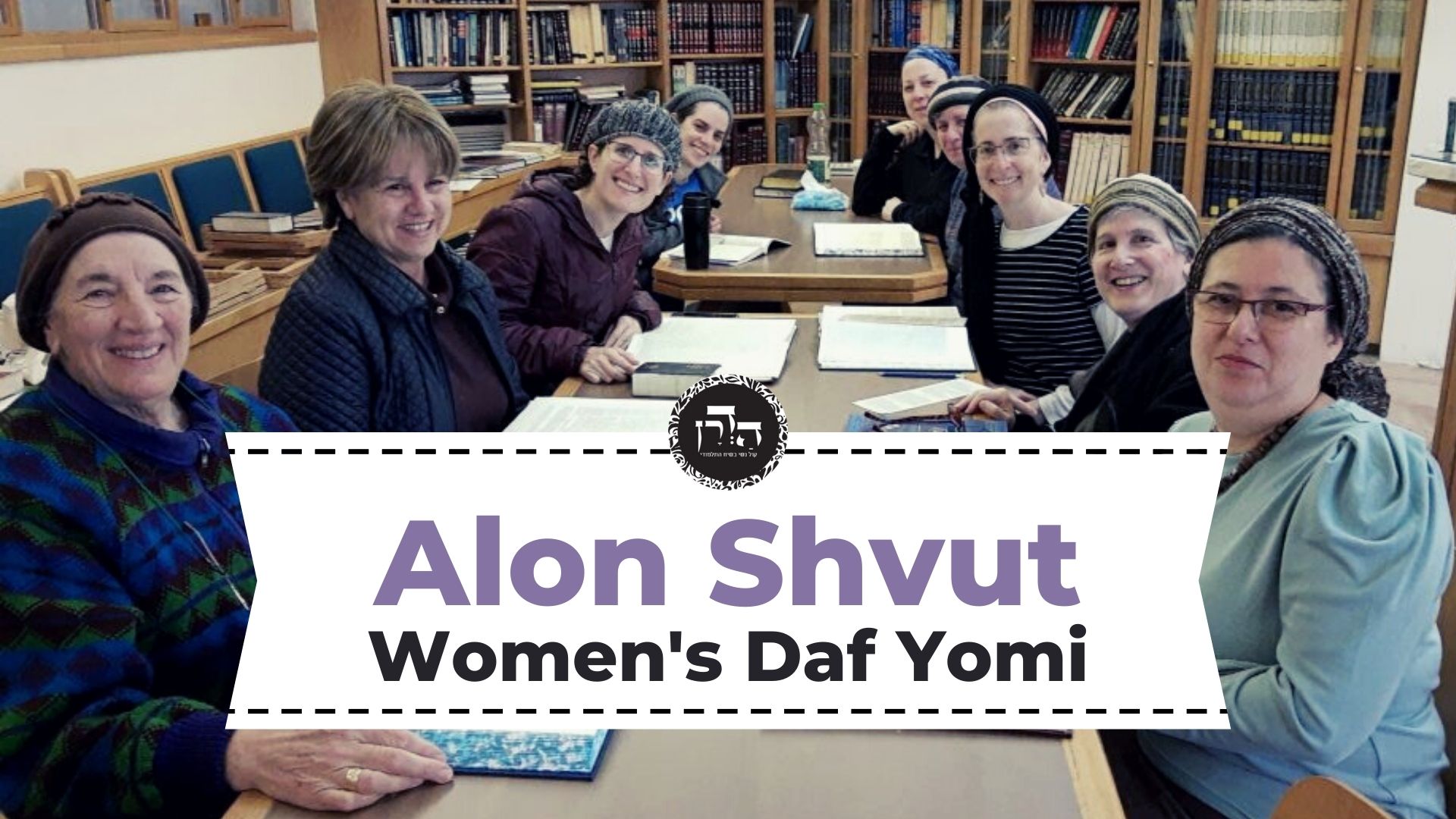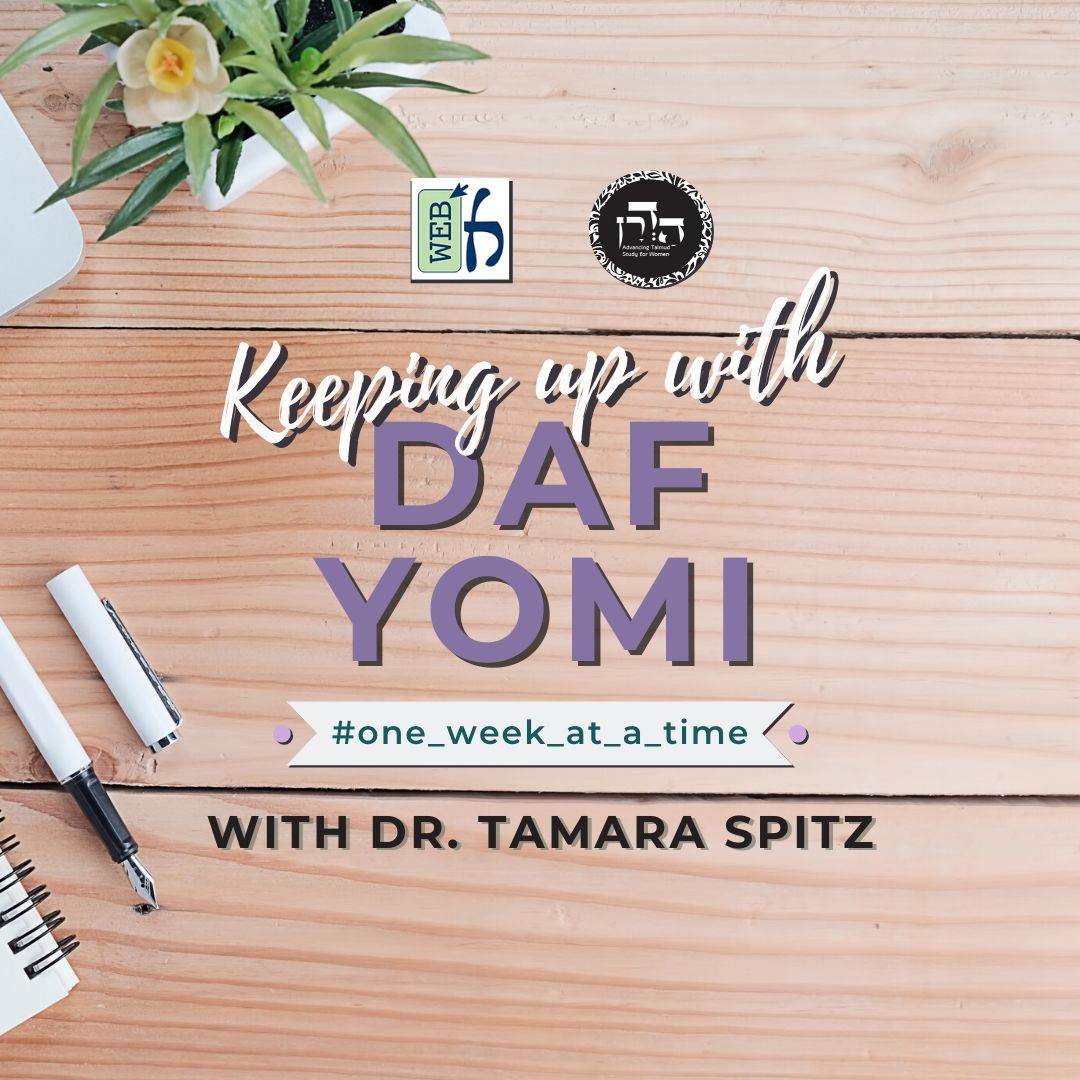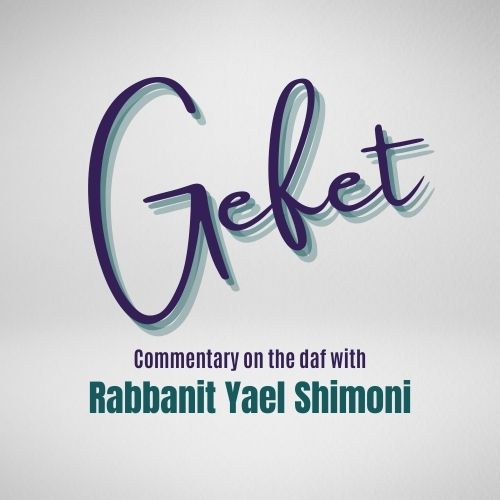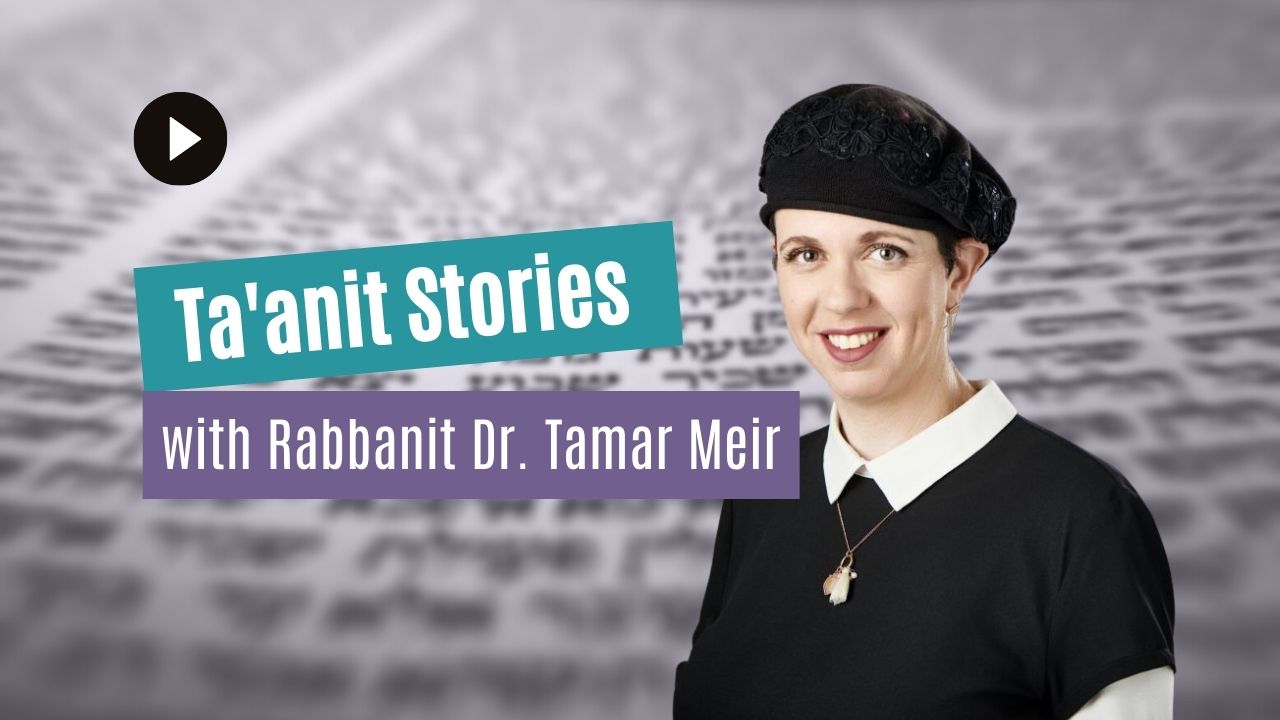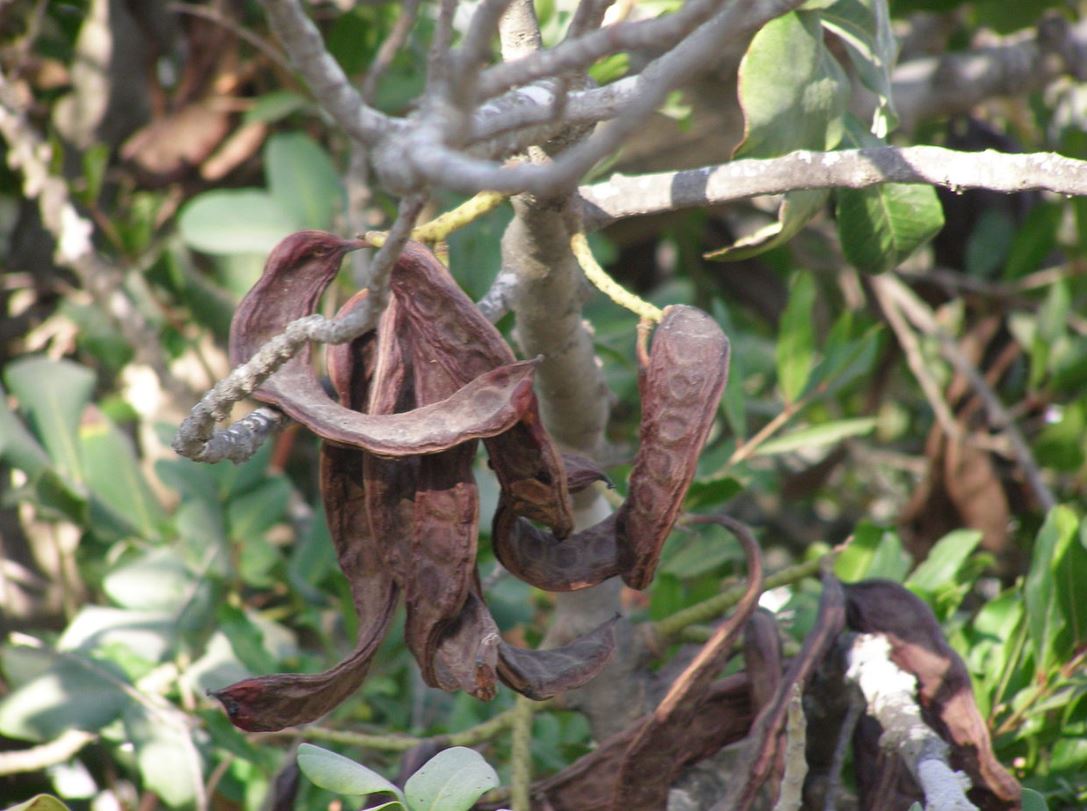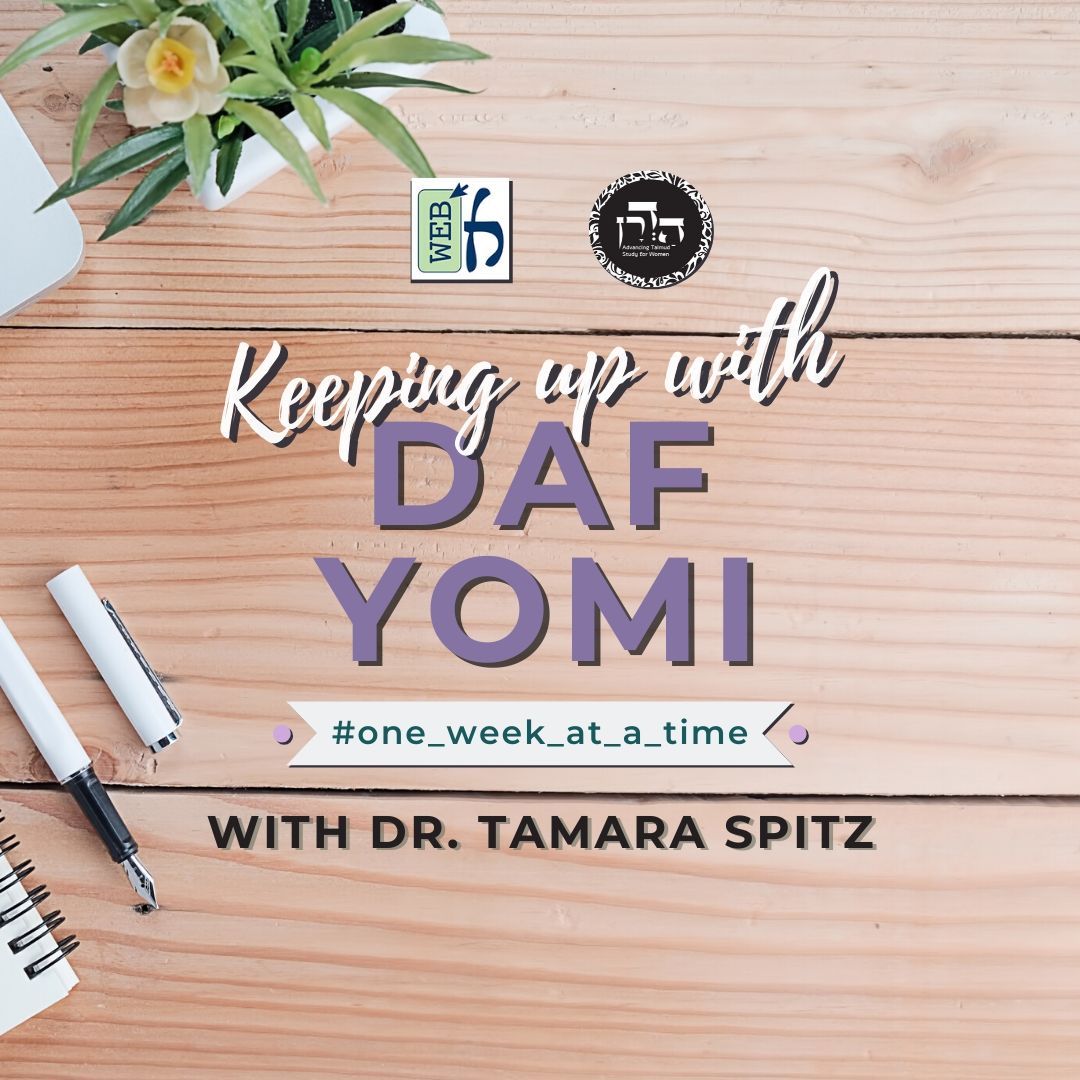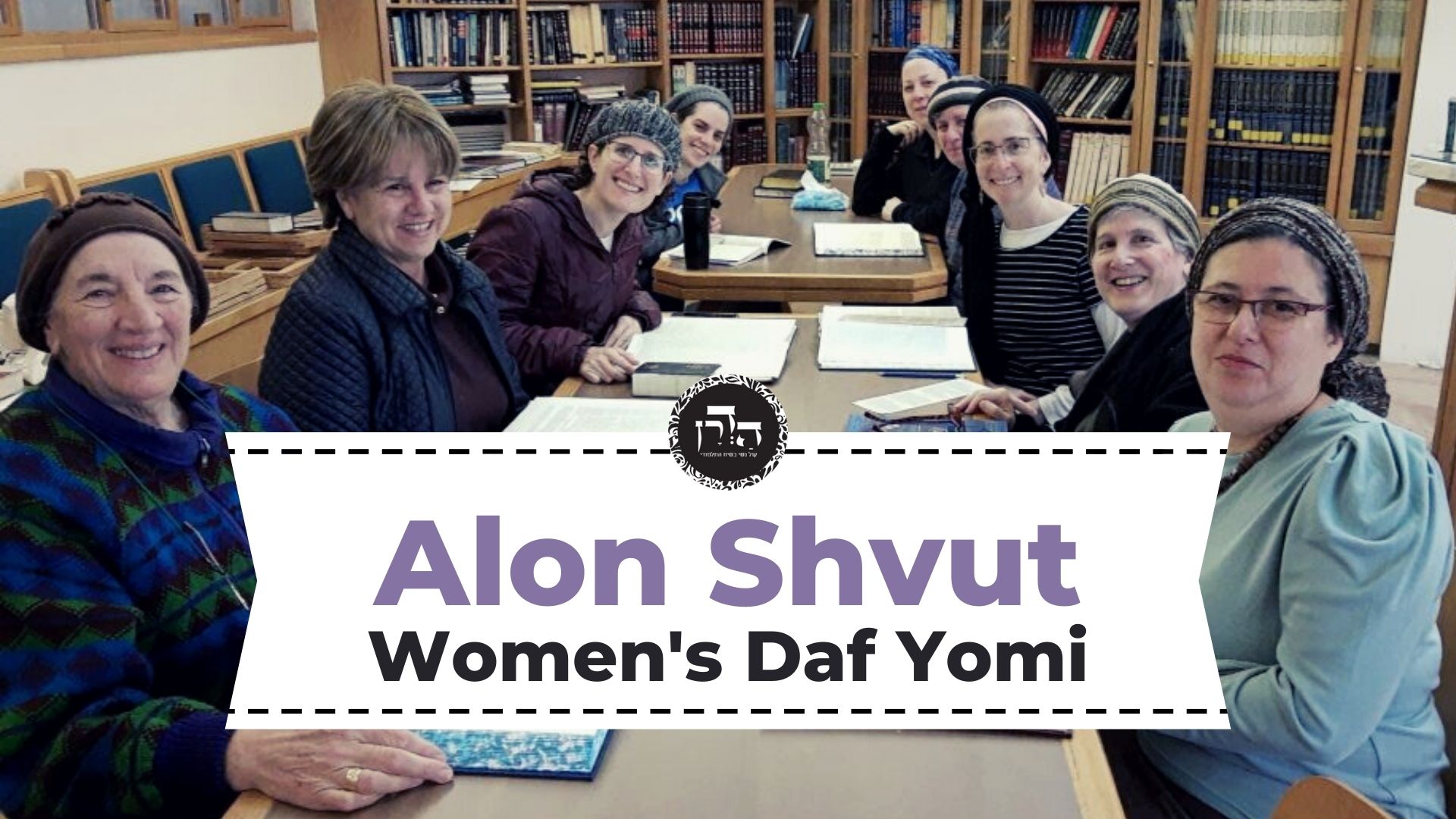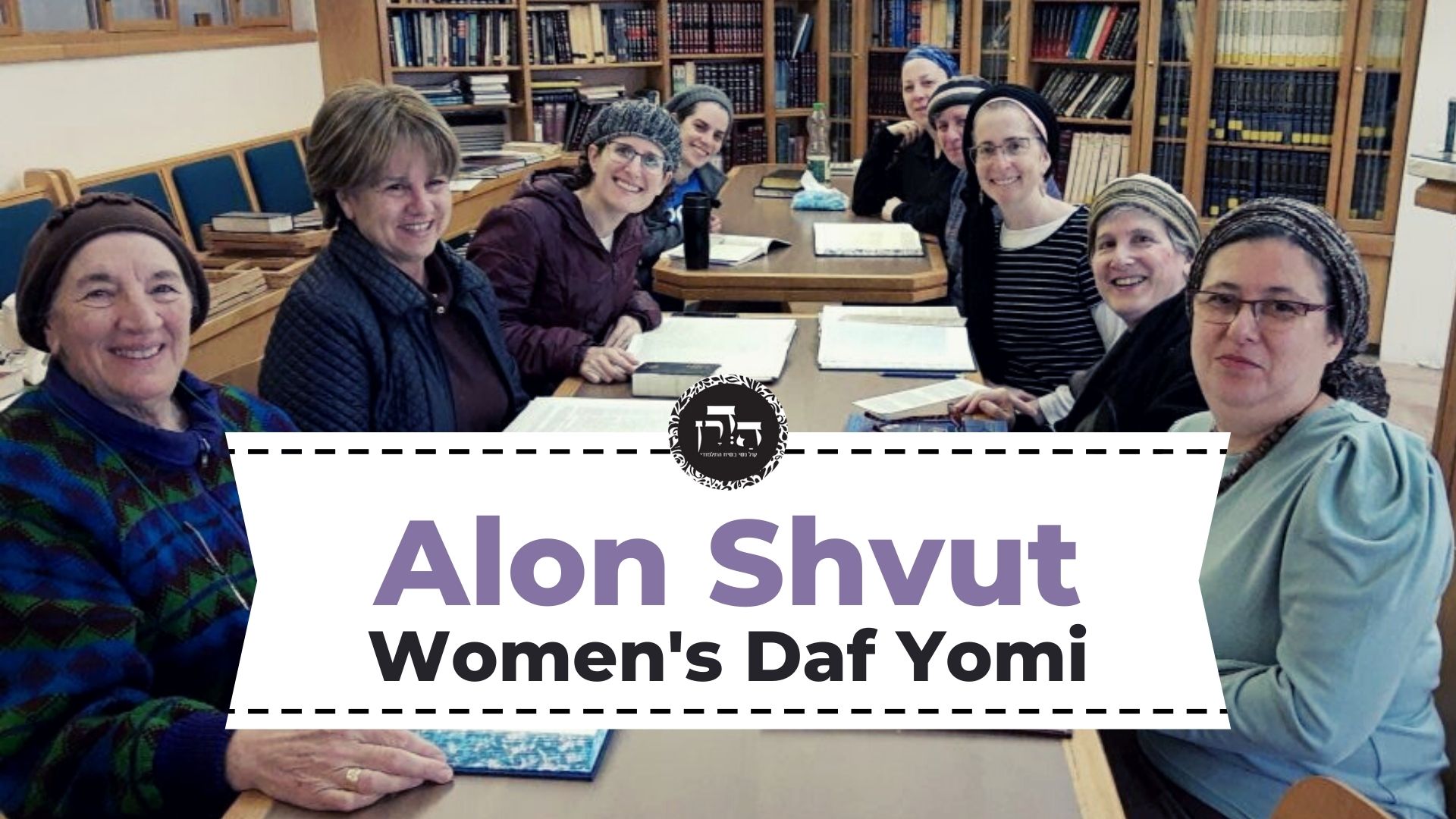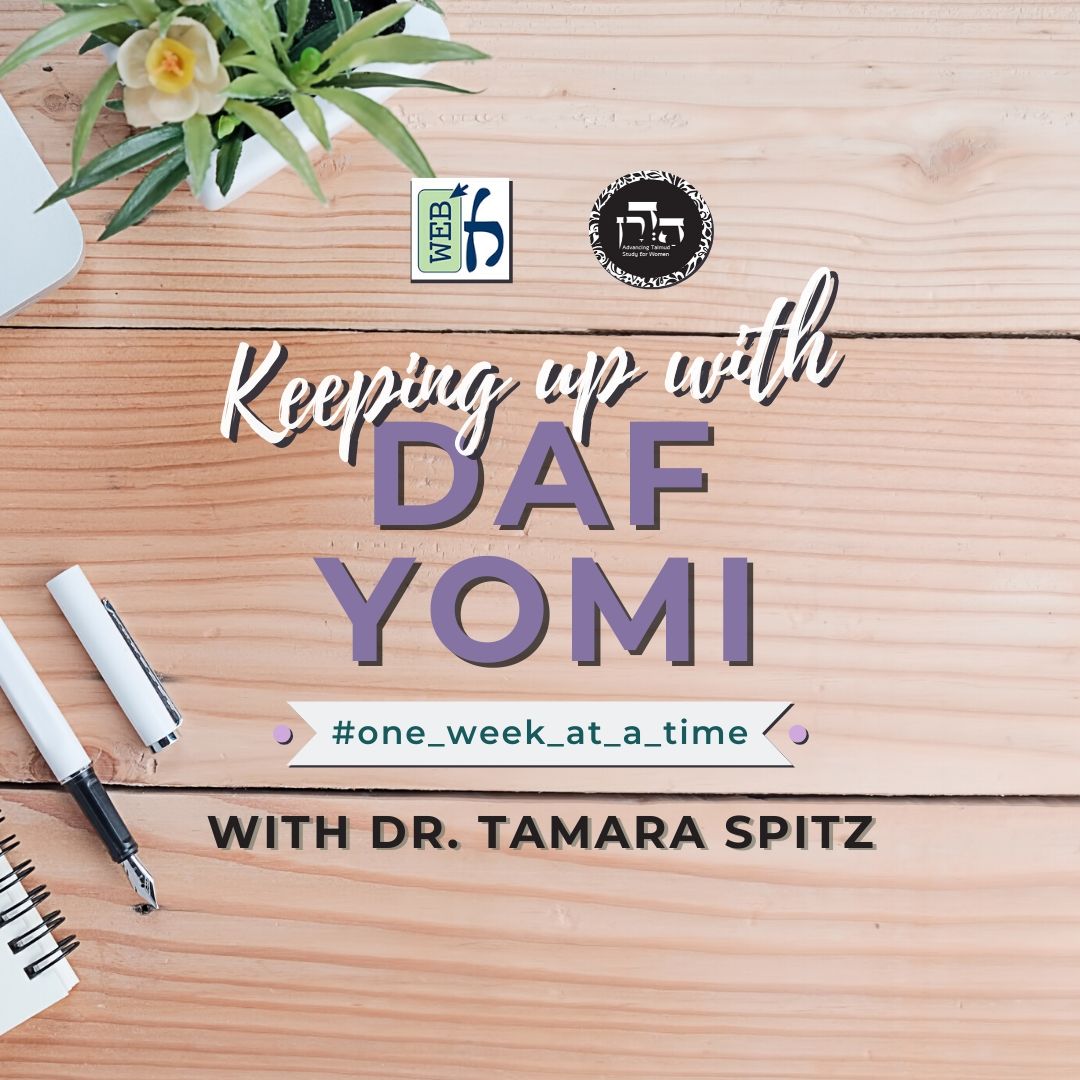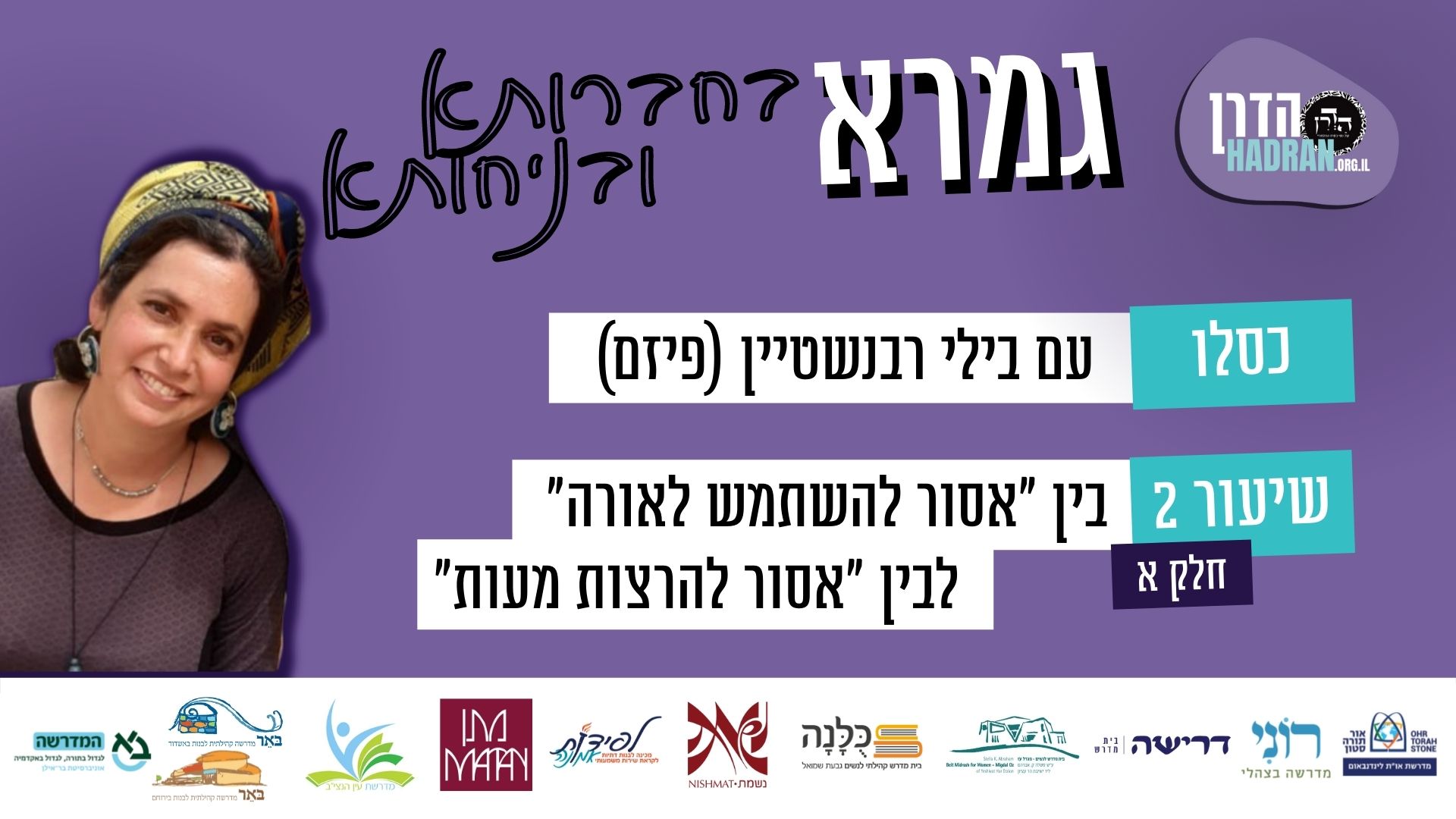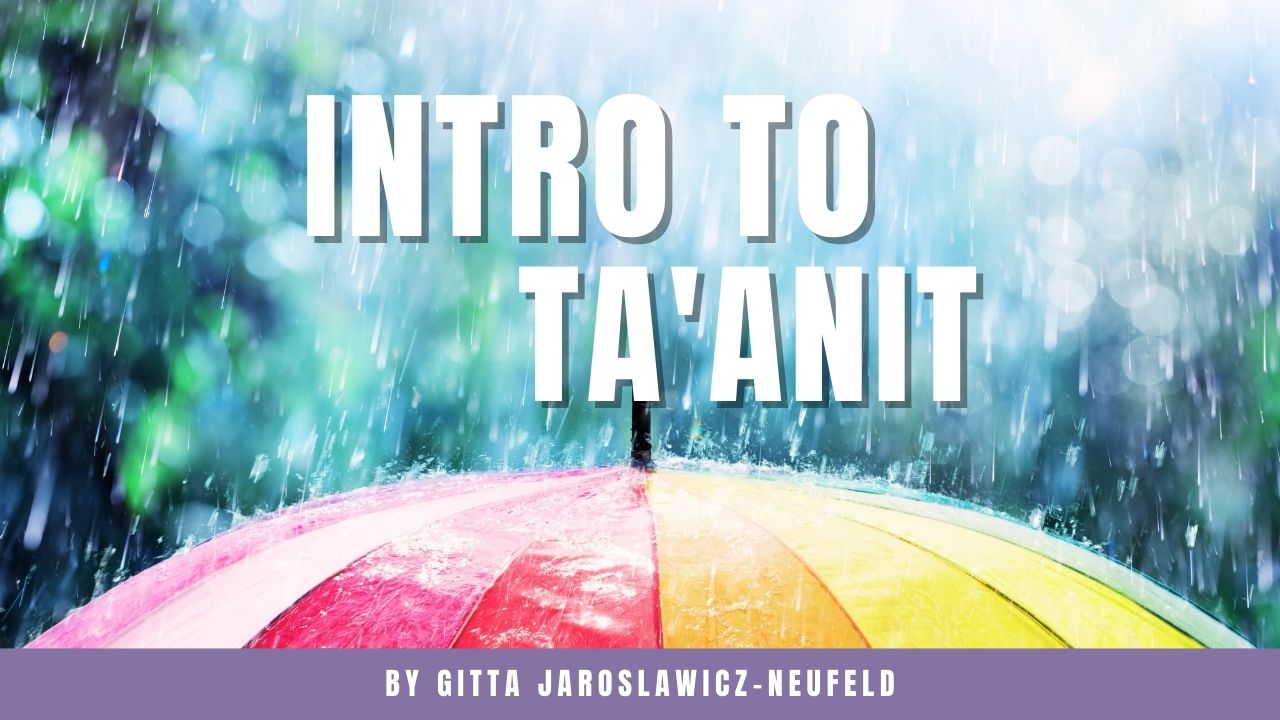What is the schedule on the public fast days – what needs to be done, when? Rav Chisda is quoted as saying that when washing is prohibited on account of mourning, one is prohibited to wash in warm or cold water but when one is prohibited to wash due to avoiding pleasure, such as on public fasts, one is permitted to wash in cold water. Several sources are brought to either support Rav Chisda’s statement or to raise a question against it. In one version of Rava’s statement, he is quoted as saying a mourner is permitted to bathe in cold water. A source is brought to question Rava and an additional one to provide support for Rava’s opinion. A different version of Rava’s statement says the opposite, that he holds that a mourner is forbidden to bathe in hot water. A source is brought to try to prove this version. There is a debate where the prayer of Aneinu is added to the prayers by an individual who accepted upon oneself a fast. Is it a separate blessing or is it added to the blessing of “shomea tefilla”?
Taanit 13
Share this shiur:
Want to dedicate learning? Get started here:


Today’s daily daf tools:
Today’s daily daf tools:
Delve Deeper
Broaden your understanding of the topics on this daf with classes and podcasts from top women Talmud scholars.
New to Talmud?
Check out our resources designed to help you navigate a page of Talmud – and study at the pace, level and style that fits you.
The Hadran Women’s Tapestry
Meet the diverse women learning Gemara at Hadran and hear their stories.
Taanit 13
אֵיפוֹךְ אֲנָא! לָא סָלְקָא דַּעְתָּךְ, דִּכְתִיב: ״וְאֵלַי יֵאָסְפוּ כֹּל חָרֵד בְּדִבְרֵי אֱלֹהֵי יִשְׂרָאֵל עַל מַעַל הַגּוֹלָה וְגוֹ׳״, וּכְתִיב: ״וּבְמִנְחַת הָעֶרֶב קַמְתִּי מִתַּעֲנִיתִי וָאֶפְרְשָׂה כַפַּי אֶל ה׳״.
The Gemara asks: I can reverse the order of events, so that the first half of the day is spent in prayer while the second half is focused on the concerns of the community. The Gemara answers: It should not enter your mind to say that, as it is written elsewhere: “Then were assembled to me everyone who trembled at the words of the God of Israel due to the faithlessness of them of the captivity and I sat appalled until the evening offering” (Ezra 9:4). And it is written in the next verse: “And at the meal-offering I arose from my fast, even with my garment and my mantle rent; and I fell on my knees and I spread out my hands to the Lord” (Ezra 9:5). These verses indicate that first one must deal with the issues of the community, and only afterward engage in prayer.
אָמַר רַפְרָם בַּר פָּפָּא אָמַר רַב חִסְדָּא: כׇּל שֶׁהוּא מִשּׁוּם אֵבֶל, כְּגוֹן תִּשְׁעָה בְּאָב וְאָבֵל — אָסוּר בֵּין בְּחַמִּין בֵּין בְּצוֹנֵן, כׇּל שֶׁהוּא מִשּׁוּם תַּעֲנוּג, כְּגוֹן תַּעֲנִית צִבּוּר — בְּחַמִּין אָסוּר, בְּצוֹנֵן מוּתָּר.
§ Rafram bar Pappa said that Rav Ḥisda said: Anything that is prohibited due to mourning, for example, bathing on the Ninth of Av, or prohibited for a private mourner, is prohibited both in hot water and in cold water. Anything that is prohibited due to pleasure, for example, bathing on a communal fast, is prohibited in hot water, but is permitted in cold water, provided one washes for the sake of cleanliness.
אָמַר רַב אִידִי בַּר אָבִין: אַף אֲנַן נָמֵי תְּנֵינָא: וְנוֹעֲלִין אֶת הַמֶּרְחֲצָאוֹת. אֲמַר לֵיהּ אַבָּיֵי: וְאִי בְּצוֹנֵן אָסוּר, סוֹכְרִין אֶת הַנְּהָרוֹת מִבְּעֵי לֵיהּ לְמִיתְנֵי?!
Rav Idi bar Avin said: We, too, learn this in the mishna: And they lock the bathhouses. This phrase indicates that only bathing in hot water is prohibited. Abaye said to Rav Idi bar Avin: And if it were also prohibited to wash in cold water, should the mishna have taught: They dam the rivers? Since it is impossible to dam the rivers to stop people from bathing altogether, the statement of the mishna is insufficient proof that only bathing in hot water is prohibited. Perhaps bathing in cold water is also prohibited but there is no way to prevent it.
אָמַר רַב שִׁישָׁא בְּרֵיהּ דְּרַב אִידִי: אַבָּא הָכִי קַשְׁיָא לֵיהּ, מִכְּדִי תְּנַן: אָסוּר בִּרְחִיצָה — נוֹעֲלִין אֶת הַמֶּרְחֲצָאוֹת לְמָה לִי? אֶלָּא לָאו, שְׁמַע מִינַּהּ: בְּחַמִּין אָסוּר, בְּצוֹנֵן מוּתָּר.
Rav Sheisha, son of Rav Idi, said, in explanation of his father’s opinion: With regard to my father, the following poses a difficulty to his ruling: Since we already learned in the mishna that one is prohibited to engage in bathing, why do I need the tanna to state: They lock the bathhouses? Practically speaking, what does this clause add? Rather, isn’t it correct to conclude from this that bathing is prohibited in hot water but permitted in cold water?
לֵימָא מְסַיַּיע לֵיהּ: כׇּל חַיָּיבֵי טְבִילוֹת טוֹבְלִין כְּדַרְכָּן, בֵּין בְּתִשְׁעָה בְּאָב בֵּין בְּיוֹם הַכִּפּוּרִים. בְּמַאי? אִילֵימָא בְּחַמִּין, טְבִילָה בְּחַמִּין מִי אִיכָּא? שְׁאוּבִין נִינְהוּ.
The Gemara proposes: Let us say that the following baraita supports Rav Ḥisda’s ruling that it is prohibited for a mourner to bathe himself even in cold water: All who are obligated in immersions immerse themselves in their usual manner, both on the Ninth of Av and on Yom Kippur. The Gemara clarifies this baraita: In what do they immerse themselves? If we say that they immerse themselves in hot water, is there such a concept as ritual immersion in hot water? Hot water is necessarily drawn water, as the water has been placed in vessels for heating, and drawn water is invalid for a ritual bath.
אֶלָּא לָאו, בְּצוֹנֵן. וְחַיָּיבֵי טְבִילוֹת — אִין, אִינִישׁ אַחֲרִינָא — לָא. אָמַר רַב חָנָא בַּר קַטִּינָא: לֹא נִצְרְכָה אֶלָּא לְחַמֵּי טְבֶרְיָא.
Rather, isn’t the baraita referring to cold water, and it teaches that those obligated in immersions, yes, they are permitted to use cold water, but another person, who is not obligated to immerse, no, he may not wash even in cold water. Rav Ḥana bar Ketina said: This is no proof, as the ruling of the baraita was necessary only for the hot springs of Tiberias, which are warm without having been drawn, and in which it is possible to immerse.
אִי הָכִי אֵימָא סֵיפָא: אָמַר רַבִּי חֲנִינָא סְגַן הַכֹּהֲנִים: כְּדַי הוּא בֵּית אֱלֹהֵינוּ לְאַבֵּד עָלָיו טְבִילָה פַּעַם אַחַת בַּשָּׁנָה. וְאִי אָמְרַתְּ בְּצוֹנֵן מוּתָּר — יִרְחַץ בְּצוֹנֵן! אָמַר רַב פָּפָּא: בְּאַתְרָא דְּלָא שְׁכִיחַ צוֹנֵן.
The Gemara objects: If so, say the latter clause of that same mishna: Rabbi Ḥanina, the deputy High Priest, said: The mourning for the House of our God, the Holy Temple, is worthy of the loss of a ritual immersion once a year. And if you say that it is permitted to immerse in cold water, why does Rabbi Ḥanina the deputy High Priest say that he loses his immersion? Let him bathe in cold water, without having to neglect his immersion or transgress the prohibitions of a fast day. Rav Pappa said: It could be argued that the baraita is referring to a place where cold water is not available, but only hot springs. In this case there is no choice but to wait until the following day to immerse.
תָּא שְׁמַע: כְּשֶׁאָמְרוּ ״אָסוּר בִּמְלָאכָה״ — לֹא אָמְרוּ אֶלָּא בַּיּוֹם, אֲבָל בַּלַּיְלָה — מוּתָּר. וּכְשֶׁאָמְרוּ ״אָסוּר בִּנְעִילַת הַסַּנְדָּל״ — לֹא אָמְרוּ אֶלָּא בָּעִיר, אֲבָל בַּדֶּרֶךְ — מוּתָּר. הָא כֵּיצַד? יוֹצֵא לַדֶּרֶךְ — נוֹעֵל, נִכְנָס לָעִיר — חוֹלֵץ. וּכְשֶׁאָמְרוּ ״אָסוּר בִּרְחִיצָה״ — לֹא אָמְרוּ אֶלָּא כׇּל גּוּפוֹ, אֲבָל פָּנָיו יָדָיו וְרַגְלָיו — מוּתָּר, וְכֵן אַתָּה מוֹצֵא בַּמְנוּדֶּה וּבָאָבֵל.
The Gemara proposes: Come and hear: When they said that one is prohibited in working on fast days, they said so only about working during the day, but at night it is permitted to work. And when they said that one is prohibited to engage in wearing shoes, they said so only in a city, but on the road it is permitted. How so? When one goes out on the road he wears shoes, but at the end of his journey, when he enters the town, he removes them. And when they said that one is prohibited to engage in bathing, they said this only with regard to bathing his entire body, but washing his face, his hands, and his feet is permitted. And similarly, you find that this ruling applies in the case of one who is ostracized, i.e., placed under a formal ban, and in the case of a mourner, who is also prohibited to engage in bathing, smearing, and wearing shoes.
מַאי לָאו — אַכּוּלְּהוּ, וּבְמַאי עָסְקִינַן? אִילֵימָא בְּחַמִּין: פָּנָיו יָדָיו וְרַגְלָיו מִי שְׁרוּ? וְהָאָמַר רַב שֵׁשֶׁת: אָבֵל אָסוּר לְהוֹשִׁיט אֶצְבָּעוֹ בְּחַמִּין! אֶלָּא לָאו, בְּצוֹנֵן!
The Gemara explains the proof from this baraita: What, is it not the case that all these halakhot refer to all of them, including one who is ostracized and one who is in mourning? And with what form of bathing are we dealing here? If we say that the baraita is referring to bathing in hot water, are bathing his face, his hands, and his feet permitted? But didn’t Rav Sheshet say: It is prohibited for a mourner to insert even his finger into hot water for the purpose of washing. Rather, is it not correct to say that the baraita is dealing with cold water? If so, it is prohibited on a communal fast to wash one’s entire body even in cold water, which contradicts the opinion of Rafram bar Pappa, citing Rav Ḥisda, who permits washing in cold water on those days for the sake of cleanliness.
לָא, לְעוֹלָם בְּחַמִּין. וּדְקָא קַשְׁיָא לָךְ ״וְכֵן אַתָּה מוֹצֵא בַּמְנוּדֶּה וּבָאָבֵל״ — אַשְּׁאָרָא קָאֵי.
The Gemara rejects this argument: No, actually the baraita is referring to bathing in hot water. And with regard to what posed a difficulty for you, the phrase: And similarly, that you find in the case of one who is ostracized and in the case of a mourner, does not refer to bathing; rather, it is referring to the rest of the prohibitions, e.g., working and wearing shoes. Consequently, it can be claimed that the baraita refers specifically to hot water, as this clause does not refer to a mourner but only to a communal fast, and bathing in cold water is permitted on communal fasts.
תָּא שְׁמַע, דְּאָמַר רַבִּי אַבָּא הַכֹּהֵן מִשּׁוּם רַבִּי יוֹסֵי הַכֹּהֵן: מַעֲשֶׂה וּמֵתוּ בָּנָיו שֶׁל רַבִּי יוֹסֵי בֶּן רַבִּי חֲנִינָא, וְרָחַץ בְּצוֹנֵן כׇּל שִׁבְעָה! הָתָם כְּשֶׁתְּכָפוּהוּ אֲבָלָיו הֲוָה, דְּתַנְיָא: תְּכָפוּהוּ אֲבָלָיו זֶה אַחַר זֶה, הִכְבִּיד שְׂעָרוֹ — מֵיקֵל בְּתַעַר, וּמְכַבֵּס כְּסוּתוֹ בְּמַיִם.
The Gemara proposes yet another proof. Come and hear a statement of a baraita, as Rabbi Abba the priest said in the name of Rabbi Yosei the priest: An incident occurred in which the sons of Rabbi Yosei, son of Rabbi Ḥanina, died, and he bathed in cold water all seven days of mourning. This indicates that a mourner is in fact permitted to bathe. The Gemara rejects this argument: There it was a case where his mourning periods came one after the other, as his sons died in quick succession, and this leniency is as it is taught in a baraita: If one’s mourning periods immediately succeeded each other and his hair grew heavy, then even though it is generally prohibited for a mourner to cut his hair, he may lighten it with a razor, and he may likewise wash his garment in water.
אָמַר רַב חִסְדָּא: בְּתַעַר — אֲבָל לֹא בְּמִסְפָּרַיִם, בְּמַיִם — וְלֹא בְּנֶתֶר וְלֹא בְּחוֹל.
With regard to this baraita, Rav Ḥisda said: One who is obligated to observe periods of mourning in quick succession may trim his hair with a razor, but not in the normal manner, with scissors. Likewise, he may wash his garment in water, but not with natron, a type of soap, nor with sand.
אָמַר רָבָא: אָבֵל מוּתָּר לִרְחוֹץ בְּצוֹנֵן כׇּל שִׁבְעָה, מִידֵּי דְּהָוֵה אַבִּשְׂרָא וְחַמְרָא. מֵיתִיבִי:
Rava said: A mourner is permitted to bathe in cold water all seven days of mourning, despite the fact that he derives a certain degree of enjoyment from the cold bath, just as it is permitted for him to eat meat and wine. The Gemara raises an objection:
אֵין הַבּוֹגֶרֶת רַשָּׁאָה לְנַוֵּול אֶת עַצְמָהּ בִּימֵי אֵבֶל אָבִיהָ. הָא נַעֲרָה — רַשָּׁאָה.
A grown woman, i.e., a girl over twelve and a half, who is old enough to be married, is not permitted to render herself unattractive during the days of mourning for her father, as this would adversely affect her chances of marriage. The Gemara infers that this halakha applies only to a grown woman, whereas a young woman, a girl between the ages of twelve and twelve and a half, who is not yet old enough to be married, is permitted to render herself unattractive.
מַאי לָאו בִּרְחִיצָה, וּבְמַאי? אִילֵימָא בְּחַמִּין, אֵין הַבּוֹגֶרֶת רַשָּׁאָה?! וְהָאָמַר רַב חִסְדָּא: אָבֵל אָסוּר לְהוֹשִׁיט אֶצְבָּעוֹ בְּחַמִּין! אֶלָּא לָאו, בְּצוֹנֵן. לָא, אַכִּיחוּל וּפִירְכּוּס.
The Gemara analyzes this halakha: What, is it not referring to the prohibition against bathing? And in what kind of water may a grown woman bathe? If we say that the baraita is referring to hot water, is a grown woman not permitted to render herself unattractive by refraining from washing in hot water? But didn’t Rav Ḥisda say: It is prohibited for a mourner to insert even his finger into hot water for the purpose of washing. Rather, is it not the case that it is permitted for a grown woman to bathe in cold water, from which it may be inferred that it is not permitted for a young woman to bathe even in cold water. The Gemara answers: No, the baraita is not speaking of bathing at all. Rather it is referring to painting the eyes and dyeing [pirkus] one’s hair, which it is permitted for a grown woman to do during mourning.
לֵימָא מְסַיַּיע לֵיהּ, דְּאָמַר רַבִּי אַבָּא הַכֹּהֵן מִשּׁוּם רַבִּי יוֹסֵי הַכֹּהֵן: מַעֲשֶׂה וּמֵתוּ בָּנָיו שֶׁל רַבִּי יוֹסֵי בַּר חֲנִינָא, וְרָחַץ בְּצוֹנֵן כׇּל שִׁבְעָה!
The Gemara proposes: Let us say that the aforementioned baraita supports Rava’s ruling. As Rabbi Abba the priest said in the name of Rabbi Yosei the priest: An incident occurred in which the sons of Rabbi Yosei, son of Rabbi Ḥanina, died, and he bathed in cold water all seven days of mourning. This ruling apparently indicates that a mourner is permitted to bathe in cold water.
אָמְרִי: הָתָם בְּשֶׁתְּכָפוּהוּ אֲבָלָיו זֶה אַחַר זֶה. דְּתַנְיָא: תְּכָפוּהוּ אֲבָלָיו זֶה אַחַר זֶה, הִכְבִּיד שְׂעָרוֹ — מֵיקֵל בְּתַעַר, וּמְכַבֵּס כְּסוּתוֹ בְּמַיִם. אָמַר רַב חִסְדָּא: בְּתַעַר — אֲבָל לֹא בְּמִסְפָּרַיִם, בְּמַיִם — וְלֹא בְּנֶתֶר וְלֹא בְּחוֹל וְלֹא בְּאָהָל.
The Gemara responds: This is not a proof, as they say: There it is referring to a case where his mourning periods came immediately one after the other, as it is taught in a baraita: If one’s mourning periods came immediately one after the other and his hair grew heavy, he may lighten it with a razor, and he may wash his garment in water. And Rav Ḥisda said: He may trim his hair with a razor, but not with scissors. Likewise, he may wash his garment in water, but not with natron, nor with sand, and nor with iceplant.
אִיכָּא דְּאָמְרִי, אָמַר רָבָא: אָבֵל אָסוּר בְּצוֹנֵן כׇּל שִׁבְעָה. מַאי שְׁנָא מִבָּשָׂר וְיַיִן? הָתָם לְפַכּוֹחֵי פַּחְדֵּיהּ הוּא דְּעָבֵיד.
The foregoing is one version of Rava’s opinion and the ensuing discussion. Some say a different version of this debate. Rava said: It is prohibited for a mourner to bathe in cold water all seven days of mourning. The Gemara asks: In what way is this case different from eating meat and drinking wine, which a mourner is permitted to do? The Gemara responds: There, he acts to relieve his anxieties. Since a mourner is typically distressed over the death of a close relative, the Sages permitted him to fortify himself with strong food and drink.
לֵימָא מְסַיַּיע לֵיהּ: אֵין הַבּוֹגֶרֶת רַשָּׁאָה לְנַוֵּול עַצְמָהּ. הָא נַעֲרָה — רַשָּׁאָה! בְּמַאי, אִילֵימָא בְּחַמִּין: אֵין הַבּוֹגֶרֶת רַשָּׁאָה?! וְהָאָמַר רַב חִסְדָּא: אָבֵל אָסוּר לְהוֹשִׁיט אֶצְבָּעוֹ בְּחַמִּין! אֶלָּא לָאו, בְּצוֹנֵן. לָא, אַכִּיחוּל וּפִירְכּוּס.
The Gemara proposes: Let us say that the following baraita supports Rava’s ruling. A grown woman is not permitted to render herself unattractive during the days of mourning for her father. As above, the Gemara infers that this halakha applies only to a grown woman, but a young woman is permitted to render herself unattractive. In what kind of water may a grown woman bathe? If we say that this is referring to hot water, is a grown woman not permitted to refrain from washing in hot water? But didn’t Rav Ḥisda say: It is prohibited for a mourner to insert his finger into hot water for the purpose of washing. Rather, is it not the case that the baraita is referring to bathing in cold water? The Gemara answers: No; the baraita is speaking of painting the eyes and dyeing the hair.
אָמַר רַב חִסְדָּא: זֹאת אוֹמֶרֶת, אָבֵל אָסוּר בְּתִכְבּוֹסֶת כׇּל שִׁבְעָה. וְהִלְכְתָא: אָבֵל אָסוּר לִרְחוֹץ כׇּל גּוּפוֹ בֵּין בְּחַמִּין וּבֵין בְּצוֹנֵן כׇּל שִׁבְעָה. אֲבָל פָּנָיו יָדָיו וְרַגְלָיו, בְּחַמִּין — אָסוּר, בְּצוֹנֵן — מוּתָּר. אֲבָל לָסוּךְ, אֲפִילּוּ כָּל שֶׁהוּא אָסוּר. וְאִם לְעַבֵּר אֶת הַזּוּהֲמָא — מוּתָּר.
Rav Ḥisda said: That is to say, i.e., as the baraita states that it is permitted for a grown woman who observes successive periods of mourning to paint and dye her hair, the same halakha evidently applies to laundry, from which it may be inferred that in an unexceptional case it is prohibited for a mourner to wash laundry all seven days of mourning. The Gemara concludes: And the practical halakha is: It is prohibited for a mourner to bathe his entire body both in hot water and in cold water all seven days of mourning. However, with regard to his face, his hands, and his feet, although it is prohibited to bathe them in hot water, in cold water it is permitted. However, with regard to smearing with oil, even any minimal amount of smearing is prohibited. But if one does so to remove the dirt, it is permitted.
צְלוֹתָא דְתַעֲנִיתָא הֵיכִי מַדְכְּרִינַן? אַדְבְּרֵיהּ רַב יְהוּדָה לְרַב יִצְחָק בְּרֵיהּ, וּדְרַשׁ: יָחִיד שֶׁקִּיבֵּל עָלָיו תַּעֲנִית — מִתְפַּלֵּל שֶׁל תַּעֲנִית, וְהֵיכָן אוֹמְרָהּ — בֵּין ״גּוֹאֵל״ לְ״רוֹפֵא״.
§ The Gemara returns to the discussion of the Aneinu prayer, recited on fast days. The prayer of a fast, how does one mention it? Rav Yehuda granted his son Rav Yitzḥak general permission to expound publicly, while instructing him in the substance of what he should say, and Rav Yitzḥak taught: An individual who took a fast upon himself prays the prayer of a fast. And where in the Amida does he recite this additional prayer? Between the seventh blessing of the Amida: Who redeems, and the eighth blessing: Who heals.
מַתְקֵיף לַהּ רַב יִצְחָק: וְכִי יָחִיד קוֹבֵעַ בְּרָכָה לְעַצְמוֹ? אֶלָּא אָמַר רַב יִצְחָק: בְּ״שׁוֹמֵעַ תְּפִלָּה״. וְכֵן אָמַר רַב שֵׁשֶׁת: בְּ״שׁוֹמֵעַ תְּפִלָּה״.
Rav Yitzḥak strongly objects to this: But may an individual establish a blessing for himself, in addition to the fixed blessings of the Amida? Rather, Rav Yitzḥak said: One mentions his fast in the blessing: Who listens to prayer, in accordance with the general principle that an individual may insert private requests into this general plea for the acceptance of prayers, including matters outside the scope of the established blessings. And similarly, Rav Sheshet said: One recites the prayer for a fast day in the blessing: Who listens to prayer.
מֵיתִיבִי: אֵין בֵּין יָחִיד לְצִבּוּר, אֶלָּא שֶׁזֶּה מִתְפַּלֵּל שְׁמוֹנֶה עֶשְׂרֵה, וְזֶה מִתְפַּלֵּל תְּשַׁע עֶשְׂרֵה. מַאי ״יָחִיד״ וּמַאי ״צִבּוּר״? אִילֵּימָא יָחִיד — מַמָּשׁ, וְצִבּוּר — שְׁלִיחַ צִבּוּר, הָנֵי תְּשַׁע עֶשְׂרֵה? עֶשְׂרִין וְאַרְבַּע הָווּ!
The Gemara raises an objection from a baraita: The only halakhic difference between an individual and a community is that this one, an individual, prays eighteen blessings in his Amida, and that one, a community, prays nineteen blessings. The Gemara analyzes this statement: What is an individual and what is a community in this context? If we say that an individual means an actual individual, and community is referring to the communal prayer leader, are there really only nineteen blessings in the communal Amida of a fast? There are twenty-four blessings. As will be explained, six additional blessings are added on communal fast days.
אֶלָּא לָאו, הָכִי קָאָמַר: אֵין בֵּין יָחִיד דְּקִבֵּל עָלָיו תַּעֲנִית יָחִיד לְיָחִיד שֶׁקִּבֵּל עָלָיו תַּעֲנִית צִבּוּר, אֶלָּא שֶׁזֶּה מִתְפַּלֵּל שְׁמוֹנֶה עֶשְׂרֵה, וְזֶה מִתְפַּלֵּל תְּשַׁע עֶשְׂרֵה. שְׁמַע מִינַּהּ: יָחִיד קוֹבֵעַ בְּרָכָה לְעַצְמוֹ!
Rather, is it not the case that this is what the baraita is saying: The only halakhic difference between an individual who took an individual fast upon himself and an individual who took a communal fast upon himself, is only that this one prays eighteen blessings, as he mentions his fast in the blessing: Who listens to prayer, and that one prays nineteen blessings. Learn from this statement that an individual may establish an individual blessing for himself.
לָא, לְעוֹלָם אֵימָא לָךְ שְׁלִיחַ צִבּוּר, וּדְקָא קַשְׁיָא לָךְ: שְׁלִיחַ צִבּוּר עֶשְׂרִין וְאַרְבַּע מְצַלֵּי — בְּשָׁלֹשׁ תַּעֲנִיּוֹת רִאשׁוֹנוֹת, דְּלֵיכָּא עֶשְׂרִים וְאַרְבַּע.
The Gemara rejects this contention: No, actually I could say to you that this mention of a community is referring to the prayer leader. And with regard to what poses a difficulty for you, that the prayer leader prays twenty-four blessings, the baraita is referring to the first three fasts, in which there are not twenty-four blessings, but only the usual eighteen blessings, plus one additional blessing for fast days.
וְלָא? וְהָא ״אֵין בֵּין״ קָתָנֵי: אֵין בֵּין שָׁלֹשׁ רִאשׁוֹנוֹת לְשָׁלֹשׁ אֶמְצָעִיּוֹת, אֶלָּא שֶׁבְּאֵלּוּ מוּתָּרִין בַּעֲשִׂיַּית מְלָאכָה, וּבְאֵלּוּ אֲסוּרִין בַּעֲשִׂיַּית מְלָאכָה. הָא לְעֶשְׂרִים וְאַרְבַּע — זֶה וָזֶה שָׁוִין!
The Gemara questions this resolution: And are the six additional blessings not recited on the first series of communal fasts? But with regard to this issue, a baraita taught the instructive phrase: The only difference between them, as follows: The difference between the first three fasts and the middle three fasts is only that on these first fasts it is permitted to perform work, and on these middle fasts it is prohibited to perform work. This indicates that with regard to reciting all twenty-four blessings, both this and that are identical.
תְּנָא וְשַׁיַּיר. מַאי שַׁיַּיר דְּהַאי שַׁיַּיר? וְתוּ: וְהָא ״אֵין בֵּין״ קָתָנֵי! אֶלָּא, תַּנָּא בְּאִיסּוּרֵי קָא מַיְירֵי, בִּתְפִלּוֹת לָא מַיְירֵי. וְאִי בָּעֵית אֵימָא: בְּאֶמְצָעֲיָיתָא נָמֵי לָא מְצַלֵּי עֶשְׂרִים וְאַרְבַּע.
The Gemara rejects this argument: The tanna taught some of the differences between the fasts, and omitted some of them. The Gemara asks: What else did the tanna omit that you can justifiably claim that he omitted this case? In other words, it is possible for the tanna to have omitted a few examples, but he would not have omitted a single case. And furthermore, the baraita does not merely offer a list of differences, as it teaches: The difference between them is only. This phrase indicates that this is the only difference. Rather, the tanna is speaking of the various prohibitions of fast days, but he is not speaking of other differences, such as those that involve the details of prayers. And if you wish, say instead that on the middle three fasts too, the prayer leader does not pray twenty-four blessings, as the six additional blessings are recited only during the last series of fasts.
וְלָא?! וְהָתַנְיָא: אֵין בֵּין שָׁלֹשׁ שְׁנִיּוֹת לְשֶׁבַע אַחֲרוֹנוֹת, אֶלָּא שֶׁבְּאִלּוּ מַתְרִיעִין וְנוֹעֲלִין אֶת הַחֲנוּיוֹת. הָא לְכׇל דִּבְרֵיהֶן — זֶה וָזֶה שָׁוִין! וְכִי תֵּימָא הָכָא נָמֵי תְּנָא וְשַׁיַּיר — וְהָא ״אֵין בֵּין״ קָתָנֵי!
The Gemara expresses surprise at this: And does the prayer leader not recite all twenty-four blessings during the middle three fasts? But isn’t it taught in a baraita: The difference between the second set of three fasts and the last seven fasts is only that in these they sound the alarm and lock the stores. This indicates that with regard to all their other matters, both this and that are identical. And if you say that here, too, he taught and omitted, but it teaches: The difference between them is only indicating that there is no other difference.
וְתִסְבְּרָא ״אֵין בֵּין״ דַּוְקָא?
The Gemara asks: And how can you understand it that way? Does the phrase: The difference between them is only, specifically mean that there is only a single difference between the cases?


